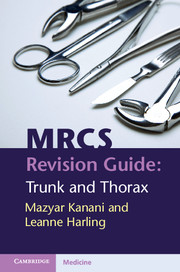Book contents
- Frontmatter
- Contents
- Preface
- Section 1 Clinical surgery in general
- Section 2 Thorax
- Section 3 Trunk
- Chapter 7 Applied surgical anatomy
- Chapter 8 Applied surgical physiology
- Chapter 9 The abdominal wall
- Chapter 10 The abdominal aorta and abdominal aortic aneurysms
- Chapter 11 The oesophagus, stomach and small bowel
- Chapter 12 The liver, biliary tree and pancreas
- Chapter 13 The spleen: splenic trauma and splenectomy
- Chapter 14 The large bowel
- Chapter 15 The rectum and anus
- Chapter 16 The kidneys and genitourinary system
- Bibliography
- Index
Chapter 11 - The oesophagus, stomach and small bowel
Published online by Cambridge University Press: 05 February 2012
- Frontmatter
- Contents
- Preface
- Section 1 Clinical surgery in general
- Section 2 Thorax
- Section 3 Trunk
- Chapter 7 Applied surgical anatomy
- Chapter 8 Applied surgical physiology
- Chapter 9 The abdominal wall
- Chapter 10 The abdominal aorta and abdominal aortic aneurysms
- Chapter 11 The oesophagus, stomach and small bowel
- Chapter 12 The liver, biliary tree and pancreas
- Chapter 13 The spleen: splenic trauma and splenectomy
- Chapter 14 The large bowel
- Chapter 15 The rectum and anus
- Chapter 16 The kidneys and genitourinary system
- Bibliography
- Index
Summary
What underlying aetiological factors have been associated with peptic ulcer disease?
Helicobacter pylori infection
Colonizes the entire gastric epithelium and causes increased gastric acid secretion by producing ammonia, which locally suppresses somatostatin inhibition of gastrin release by antral D cells. H. pylori also disrupts mucosal integrity by release of proteases and phospholipases.
Non-steroidal anti-inflammatory drugs (NSAIDs)
Inhibit cyclo-oxygenase and decrease prostoglandin production. Prostaglandins (E type) act to increase both mucosal blood flow and the production of mucus and bicarbonate, which form a protective layer and act as a buffer for gastric acid, respectively. There is a dose-dependent relationship. Selective Cox-2 inhibitors have been shown to lower the risk of gastric ulceration but do not eliminate this risk.
- Type
- Chapter
- Information
- MRCS Revision Guide: Trunk and Thorax , pp. 80 - 90Publisher: Cambridge University PressPrint publication year: 2012



